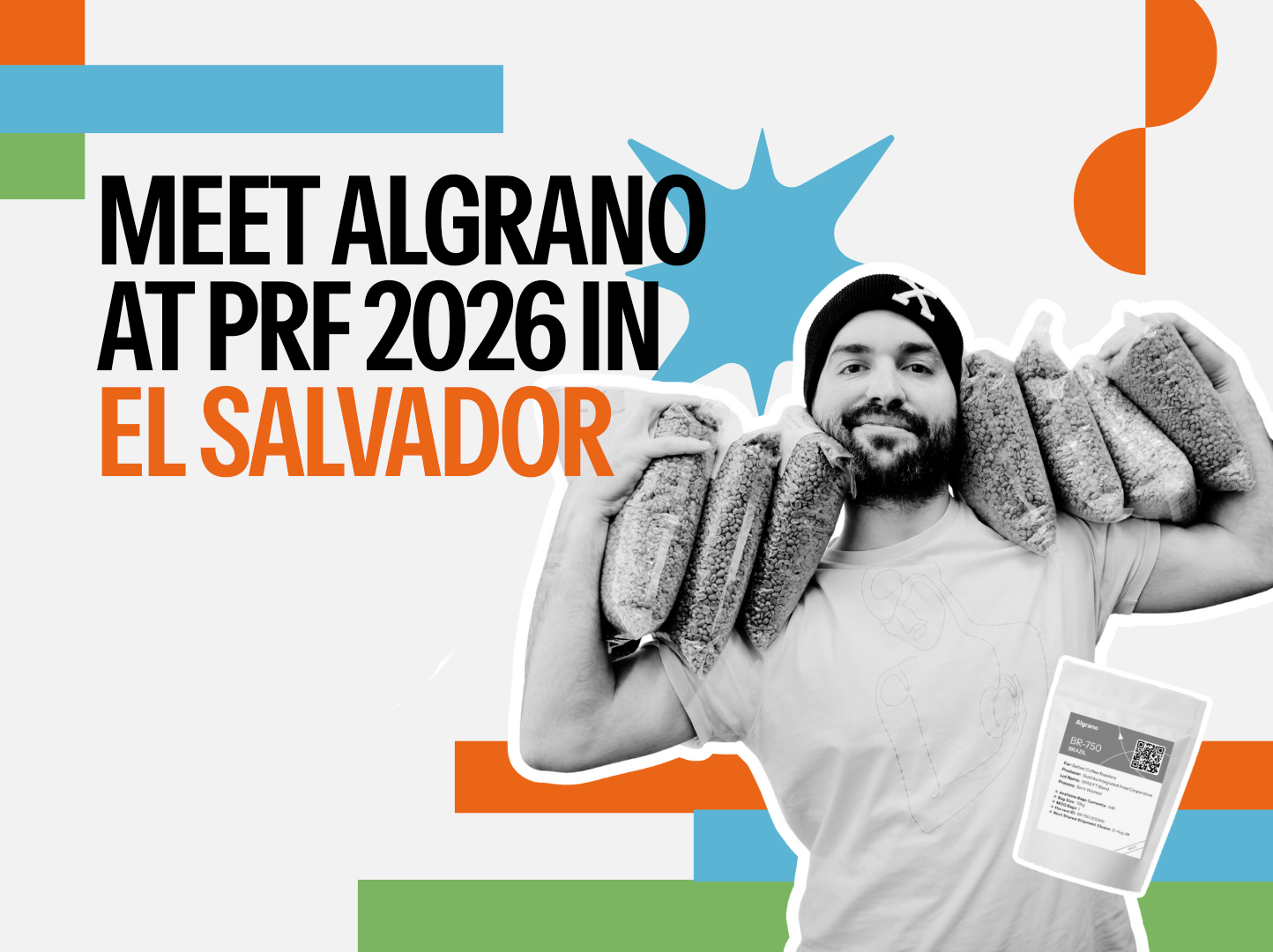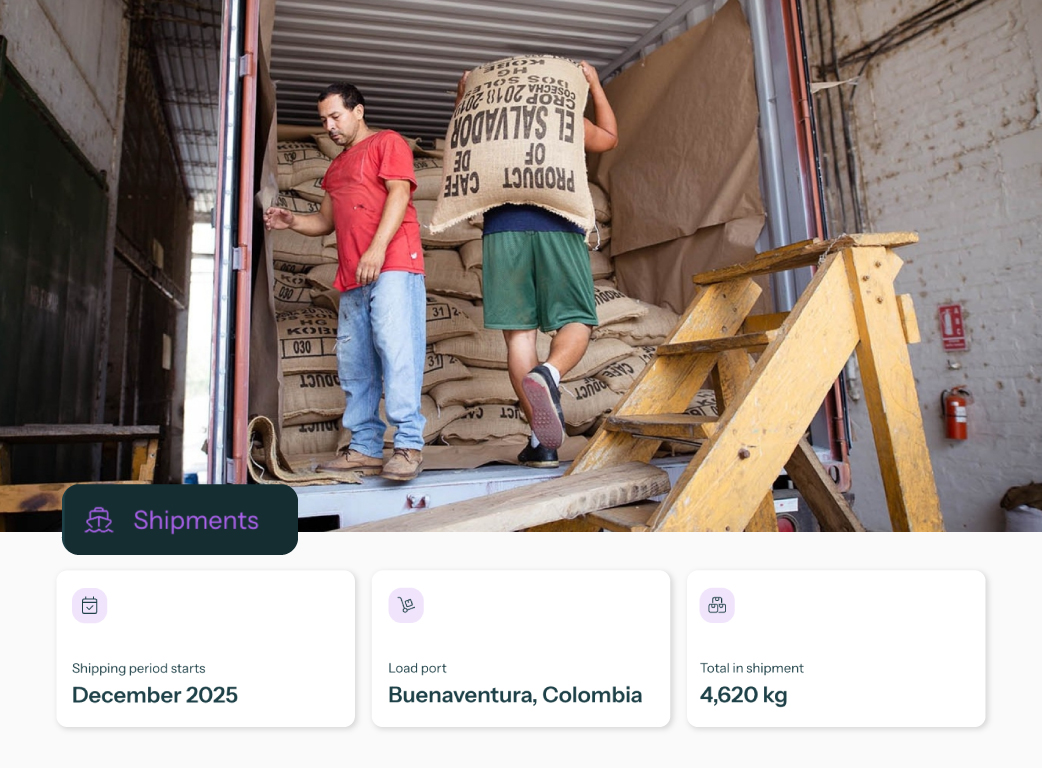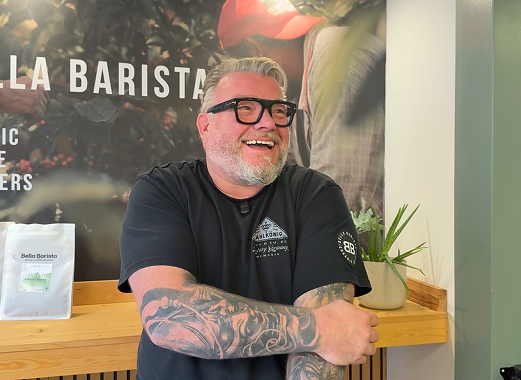Coming to PRF 2026 El Salvador? Discover how the Algrano Matchmaking Area at the event connects you with shared shipment solutions, financing, and 1:1 direct trade partnerships.


Coming to PRF 2026 El Salvador? Discover how the Algrano Matchmaking Area at the event connects you with shared shipment solutions, financing, and 1:1 direct trade partnerships.
.png)
This season is defined by a structural shift in raw material costs. For roasters, this means the era of cheap, easy-to-find spot offerings is ending for this season. To secure the quality you want, you should shift to active forward planning.
.jpg)
Your 18-month guide to shipments and arrivals, helping you colourfully plan ahead and enjoy the unique benefits of working directly with producers.
Coming to PRF 2026 El Salvador? Discover how the Algrano Matchmaking Area at the event connects you with shared shipment solutions, financing, and 1:1 direct trade partnerships.

.png)
Algrano and the African Fine Coffees Association are joining forces. We are bringing a delegation of more than 20—including buyers from the US and Europe—to Ethiopia. Join our panel on "Why buying from Africa feels hard" and attend our Open Cupping.

Track your upcoming shipments easily in your Algrano account. See your contracts onboard the container, the shipping dates, the load port, and find the contacts of the responsible exporter.

Nico Herr of Mountain Harvest shares her experience in sales to roasters, alongside one of her partners, Luci Ramirez from Humboldt Bay Coffee. They walk you through what it takes to pitch coffees to roasters, and how to start strong relationships.
This season is defined by a structural shift in raw material costs. For roasters, this means the era of cheap, easy-to-find spot offerings is ending for this season. To secure the quality you want, you should shift to active forward planning.
.png)
.png)
This season is defined by a structural shift in raw material costs. For roasters, this means the era of cheap, easy-to-find spot offerings is ending for this season. To secure the quality you want, you should shift to active forward planning.
.jpg)
Your 18-month guide to shipments and arrivals, helping you colourfully plan ahead and enjoy the unique benefits of working directly with producers.
.png)
Join us in Zurich or Raleigh to celebrate two of our partners: Sancoffee and Clearpath. Get an exclusive look at their amazing auction lots before they are gone!
Get insights from industry leaders, sourcing guides, and harvest updates sent straight into your inbox.
.jpg)
Your 18-month guide to shipments and arrivals, helping you colourfully plan ahead and enjoy the unique benefits of working directly with producers.

Producers are getting more business and premiums, while new roasters are sourcing more coffee than ever with confidence. Learn about Algrano’s impact, pre-financing, data sharing with producers, and what's beyond relationship coffee.
%201.png)

Coming to PRF 2026 El Salvador? Discover how the Algrano Matchmaking Area at the event connects you with shared shipment solutions, financing, and 1:1 direct trade partnerships.
.png)
This season is defined by a structural shift in raw material costs. For roasters, this means the era of cheap, easy-to-find spot offerings is ending for this season. To secure the quality you want, you should shift to active forward planning.
.jpg)
Your 18-month guide to shipments and arrivals, helping you colourfully plan ahead and enjoy the unique benefits of working directly with producers.
.png)
Algrano and the African Fine Coffees Association are joining forces. We are bringing a delegation of more than 20—including buyers from the US and Europe—to Ethiopia. Join our panel on "Why buying from Africa feels hard" and attend our Open Cupping.
.png)
The US coffee tariff is gone, but the specific 40% duty on Brazilian coffee hasn't dropped. Here is the breakdown of the conflicting orders and what you need to know before approving your next shipment.

Track your upcoming shipments easily in your Algrano account. See your contracts onboard the container, the shipping dates, the load port, and find the contacts of the responsible exporter.
.png)
Join us in Zurich or Raleigh to celebrate two of our partners: Sancoffee and Clearpath. Get an exclusive look at their amazing auction lots before they are gone!
.png)
Higher quality from Brazil's 2025 harvest is being held back by producers waiting for better prices, creating a challenge for roasters. Keep reading to learn the essential strategies you'll need to navigate the market and secure your supply of coffee.
.png)
Sam LaRobardiere, owner of Theory Coffee Roasters, talks about how he was caught in a reactive cycle of stress and compromise buying spot, but he found a way forward.

Discover how Marcel Binley of Bella Barista turned crippling cash flow and scary logistics into peace of mind, business certainty, and 30-40% anticipated growth through a partnership with Algrano.
%20(1).png)
This post brings the most impactful insights from our recent Roasters Panel on the 50% Brazilian Tariffs, offering strategic guidance on how to navigate the shift.

Nico Herr of Mountain Harvest shares her experience in sales to roasters, alongside one of her partners, Luci Ramirez from Humboldt Bay Coffee. They walk you through what it takes to pitch coffees to roasters, and how to start strong relationships.